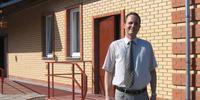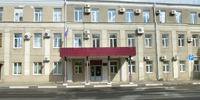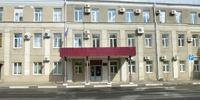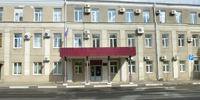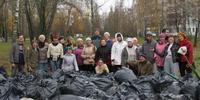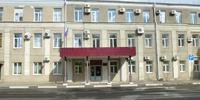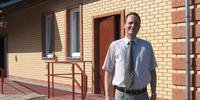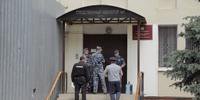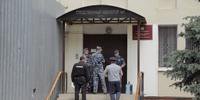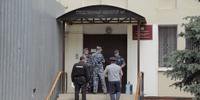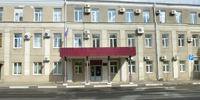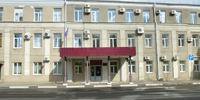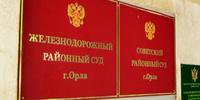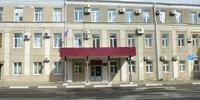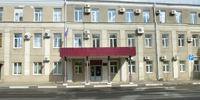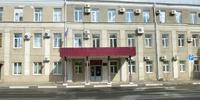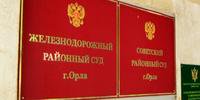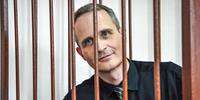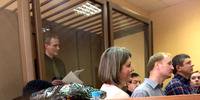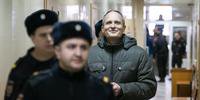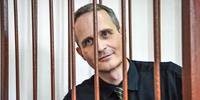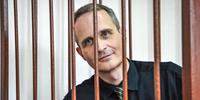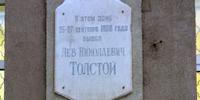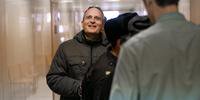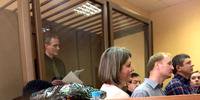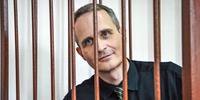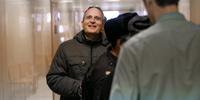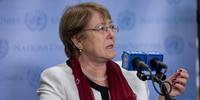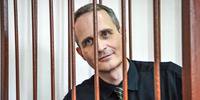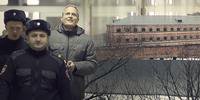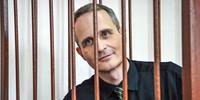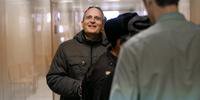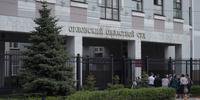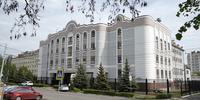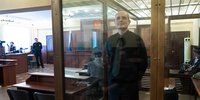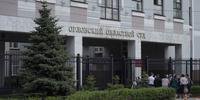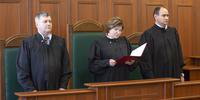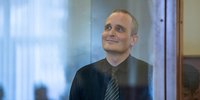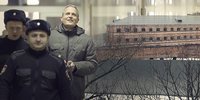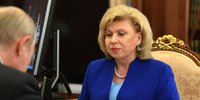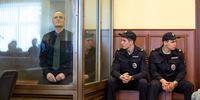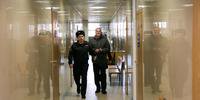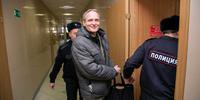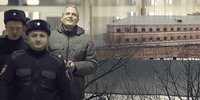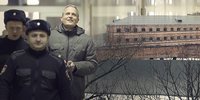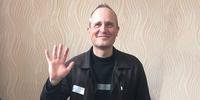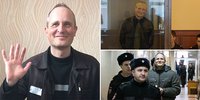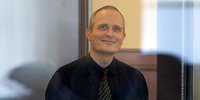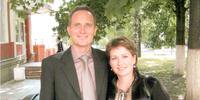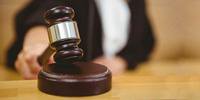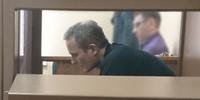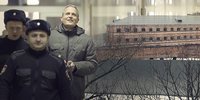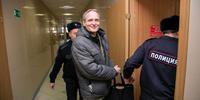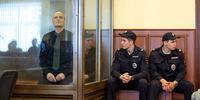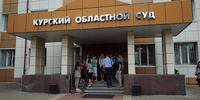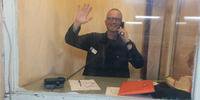Case of Christensen in Oryol
Filter
- #
- #
- #
- #
- #
- #
- #
- #
- #
- #
- #
- #
- #
- #
The Zheleznodorozhny District Court of Oryol has begun a preliminary hearing in the criminal case of Dennis Christensen, one of Jehovah's Witnesses by religion, accused of "organizing the activities of an extremist organization." The lawyers requested the exclusion of inadmissible evidence from the case.
- #
- #
- #
- #
Dozens of people gathered for the court hearing, including Dennis' friends and local journalists. Christensen was taken into the courtroom in handcuffs. Judge Alexei Rudnev gave Christensen additional time to familiarize himself with the criminal case, but did not allow him to familiarize himself with the material evidence in more detail: videos, photos and items seized during the searches. After the meeting, those present had a few moments to say words of encouragement to Dennis.
- #
- #
The prosecutor of the investigative department of the prosecutor's office of the Oryol region, lawyer of the 1st class Ivan Fomin, announced the charge. It is replete with such general phrases that, according to Christensen, he never understood what he was accused of. The defendant's lawyers stressed that the consequences of the ban on Jehovah's Witnesses organizations should not violate a person's right to freedom of religion. The prosecution did not provide a description of the places and times of the alleged crimes, the methods, consequences and other things that are necessary for sentencing.
- #
The court questioned two witnesses for the prosecution. One of them, an FSB officer, said that he followed Christensen, but did not hear what he was talking about with people. Also, during a search of the home of a family of believers, this operative seized a number of things that were not listed and described anywhere. He explained his actions by the fact that he acted under the direction of his superior.
Another prosecution witness, a local resident, said that she attended meetings of Jehovah's Witnesses from 2013 to December 6, 2015. She was unable to give any testimony about Christensen's activities after the court liquidated the local religious organization of Jehovah's Witnesses.
- #
The court interrogated a 78-year-old local woman who professes the doctrine of Jehovah's Witnesses for 2.5 hours. All this time the woman was standing. The believer was asked many questions not only about Christensen, but also about the activities of Jehovah's Witnesses in general.
- #
- #
The court questioned prosecution witnesses. One of them, district police officer Maxim Ranev, on whose territory the worship building is located, explained that the Supreme Court did not prohibit the beliefs of Jehovah's Witnesses, only a legal body was banned.
Another witness, Eduard Gavrikov, said that his mother, with whom he does not live, professes the religion of Jehovah's Witnesses. Gavrikov admitted that he treats Jehovah's Witnesses negatively, he never attended their services. According to the witness, Christensen came to his mother's apartment to help her niece get out of the room in which the lock broke.
FSB operative Pavel Azarenkov told the court that he had been monitoring Christensen at the place of worship and making audio and video recordings using special equipment.
- #
FSB officer Pavel Azarenkov continued to testify. He explained that the Oryol Regional Court and the Supreme Court of the Russian Federation did not ban the religion of Jehovah's Witnesses, and in Oryol it is allowed to read the Bible, pray and spread their religious beliefs together with others, including on the street.
Christensen's fellow believer was questioned at the hearing. The judge was keen to know how her religion differed from Orthodoxy. The witness said that after the visit of FSB officers to her work in kindergarten No. 11 in Orel, she was forced to resign. The security forces explained to the head of the institution that Jehovah's Witnesses "do not have the right to work in kindergartens." The court stopped the lawyers' attempt to find out the names of the operatives from the witness.
- #
The court questioned a local resident who lived near the worship building of Jehovah's Witnesses. He said that believers went to meetings "as if on a holiday" - decently dressed, sober, with children. The yard was cleaned, snow was cleaned in winter, and the lawn was mowed in summer. The witness said he did not see who was in charge of the cleanup. The state prosecution said that the preliminary testimony was different - Christensen was in charge of cleaning. The court decided to read out the witness's previous testimony, but forbade lawyers to ask what the witness said was true. The judge's actions prompted the lawyers to challenge him, but the court rejected it.
A retired pediatrician who has been practicing the religion of Jehovah's Witnesses for about 25 years also spoke at the trial. She said that Christensen, like herself, read the Bible at worship services. The judge inquired about the witness's attitude to blood transfusions, although this issue is not related to the charges against Christensen. The witness said that, after working as a doctor for many years, she decided to look for alternatives to blood transfusion for medical and religious reasons.
- #
- #
The judge continued to question the pediatrician with 35 years of experience, asking many questions about blood transfusions. The witness spoke in detail about alternatives to transfusion, and also mentioned the Order of the Ministry of Health No. 363, according to which before using donated blood, the doctor is obliged to inform the patient about the risks and obtain his written consent. At the same time, the doctor does not have the right to ignore the patient's decision or demand an explanation of his will.
The judge was particularly interested in who organized the cleaning of the Kingdom Hall, who opened it, who welcomed the guests, and whether it was Christensen. The witness explained that such actions were matters of simple hospitality and etiquette. She herself, if necessary and if possible, participated in the cleaning, driven by a personal impulse.
The prosecutors asked the witness to tell about what happened on May 25, 2017, when law enforcement officers came to their service and Christensen was arrested, the woman said that "I have never seen such a spectacle in my life, it was very scary, like a horror movie."
- #
- #
It was planned to interrogate a secret prosecution witness, who, as the lawyers suspect, is Oleg Kurdyumov, a lecturer at the Department of Humanities and Natural Sciences of Oryol State University, a graduate of the Department of Religious Studies and Theology, a specialist in the field of near-Orthodox heresies. The lawyers petitioned for the court to compare the surname, name and patronymic of the witness in the "secret envelope" with similar data in the protocol of Kurdyumov's interrogation. The court denied the petition.
- #
- #
The court allowed journalists to cover the trial contrary to the prosecutor's demands and allowed the interrogation of the "secret witness". The witness himself did not appear in court, so written documents were read out at the hearing. The state prosecutor read out the decisions on fines and the ban on LRO in Orel. The first, as it turned out, was canceled. And the second did not imply, according to the Supreme Court ruling, a ban on the private practice of the religion of Jehovah's Witnesses. The prosecutor also unsuccessfully tried to expose Sberbank's financial transactions with the accounts of the LRO as the activities of the LRO after the ban.
- #
The court decided to watch the secret video recording of the service behind closed doors, without listeners. The recording was watched without the permission of those who were recorded on it.
- #
The court rejected the prosecutor's request to restrict journalists' access to the trial. The interrogation of the "secret witness" began, whose voice was distorted by the equipment so much that it was impossible to understand his speech. Therefore, the interrogation was postponed.
- #
The "secret witness" gave contradictory testimony and selective answers to questions from the defense. He said that he attended the services of Jehovah's Witnesses about 10 times, admitting that the essence of peaceful events was to discuss the Bible, pray, and chant. He described Jehovah's Witnesses as those who maintain "working relations with the state, but do not serve in the armed forces." He also recounted a number of myths about the Witnesses—that believers break off relations with relatives if they practice another religion for fear of "going to hell," although Jehovah's Witnesses do not believe this. Having said that only "his own" could get to the meetings of believers, the witness found it difficult to answer how he himself got to them. Christensen was called the "secret witness" the main Jehovah's Witness in the Oryol region.
- #
These days, the trial was held behind closed doors, as video recordings of the services that took place on February 19 and 26, 2017 were examined. The video recordings were made secretly on the instructions of the FSB Directorate for the Oryol Region.
- #
A new witness, 55-year-old Sergey Filippov, who has been one of Jehovah's Witnesses for 13 years, was questioned. After the outbreak of hostilities in the Donbass, he moved to Russia with his wife and children. In Oryol, he regularly attended services of Jehovah's Witnesses, and did not notice signs of extremism.
- #
The prosecutor read out documents showing that the conversation between Kurdyumov and Christensen in the Country Chicken café on May 16, 2017 was secretly recorded on a dictaphone. 9 days after that meeting, Christensen was arrested. The defense pointed out that the printed transcript made by the FSB officers in some places distorts the meaning of what Christensen said during the conversation. The court, at the suggestion of Christensen's lawyers, examined the audio recording behind closed doors. The motives for the meeting between the Orthodox theologian Kurdyumov and Christensen during the secret surveillance of the FSB remained behind closed doors.
- #
The prosecutor examined the documents of the case, from which it follows that the security forces, by court decision, listened to the telephone conversations of Dennis Christensen and four other citizens for six months. Christensen's conversations were tapped even after he was placed in a pre-trial detention center, until January 2018.
The court listened behind closed doors to audio recordings of telephone conversations of those who appear in the materials of the criminal case.
- #
The court continued to listen to recordings of Christensen's telephone conversations. The defense petitioned for the interrogation of witnesses who left Russia. The court postponed the decision on this issue.
- #
The meetings were held behind closed doors, and telephone conversations between Dennis Christensen and other Jehovah's Witnesses in Orel were examined.
- #
The court examined court decisions recognizing extremist literature seized during searches. For these publications, either the date of the court decision or the date of entry into the FSEM refers to the time after the period imputed to Christensen. The audience was revived by the fact that the Bible in the New World Translation was recognized as extremist material on the basis of an examination carried out by a mathematics teacher.
- #
The meeting was devoted to the review of the case materials. Christensen's lawyers drew attention to many violations and misinterpretations made by the investigation during the collection of materials.
- #
The court examined materials found on digital media seized during searches from Dennis and Irina Christensen, as well as from other believers in Orel. Correspondence between the defendants was investigated behind closed doors.
- #
- #
The court continued to examine the files found on the computers and phones seized from believers. On one of the media, a file was found with the text of a dialogue on faith, during which a website included in the FSEM was mentioned. However, it was established that the file was created long before the period imputed to Christensen, in 2013, and was found not in Dennis Christensen, but in another person.
- #
- #
During the court session, excerpts from electronic religious books found on Dennis Christensen's computer were read out - the motivation to keep peace with people, to strengthen family ties, especially if the life partner has a different religion.
The state prosecution paid attention to the requirements for the elders of the Christian congregation of Jehovah's Witnesses as those who "must be impeccable, sensible, not belligerent ..." Lawyers noticed that this does not correspond to the appearance of the criminal.
The prosecutor asked Christensen if he knew of cases in which Jehovah's Witnesses "obeyed God more" than state laws. He cited the example of the German Witnesses who, during World War II, went to concentration camps instead of the front, refusing to kill Russian soldiers.
- #
- #
The court once again extended Christensen's detention for 3 months - until February 1, 2019. The next day, a complaint was filed against this decision.
- #
The court examined the contents of other believers' tablets, electronic files that Christensen had nothing to do with. According to the prosecution, the presence of e-books indicates conspiracy. Lawyers consider this interpretation far-fetched.
Describing the files, the investigator unreasonably attributed them as belonging to the LRO of Jehovah's Witnesses Oryol, although there was no information about the LRO in the files, which the prosecutor admitted.
- #
Trying to prove Christensen's guilt, the prosecution attached to the case a certificate from the military registration and enlistment office about 9 conscripts who "refused to serve in the army" for reasons of conscience. The lawyers drew attention to the fact that the conscripts acted according to the law and gave their civic duty to the state, using the right to alternative service. Some, for example, were sent to a gerontological center to take care of the elderly, others to the Russian Post.
- #
Christensen's defense drew the court's attention to the fact that after the initiation of a criminal case against Dennis, he was not arrested for some time. This means that the investigator himself did not believe that Christensen could go into hiding. Consequently, his detention is unreasonable. In addition, the lawyers identified shortcomings in the examinations.
- #
The interrogation of the defense witness of the former chairman of the local religious community of Jehovah's Witnesses, Vladimir Melnik, has begun. It clearly distinguished between the activities of a legal entity (LRO) and religious groups. The LRO basically held only 2-3 services a year - congresses. Before the ban, one of these congresses was disrupted by the security forces, and after the ban they were not held. The rest of the services were conducted by believers on the basis of the law on religious groups. Melnik stressed that the LRO included only a few people, and Christensen was not among them. Melnik also said that the LRO was closed by a court decision after planting banned literature.
- #
The interrogation of witness Vladimir Melnik continued. He said that the meetings of the LRO are different from other religious meetings of Jehovah's Witnesses - they have a much larger number of attendees and last about 6 hours.
The prosecutor tried to prove the connection between the LRO and the Administrative Center by quoting various clauses of the statutes. The witness explained that the connection between the two organizations is canonical, in doctrine. Legally, these are different organizations.
Recall that the Supreme Court of Russia banned most of the local organizations of Jehovah's Witnesses only on the grounds that it considered them "branches" of the Administrative Center.
- #
- #
The court attached to the case information from lawyers that a number of Jehovah's Witnesses publications found on electronic media during the search were not included in the list of extremist materials during the period when Christensen could use them.
The court also decided to conduct an examination of DVDs with video recordings of operational actions dated February 19 and 26, 2017 for traces of editing.
In addition, Christensen's lawyer read out the analysis of the linguist, Ph.D. Ivanenko, an interview with a religious scholar, Ph.D. Vovchenko, who calls Jehovah's Witnesses unsafe for society, attached to the case. According to Ivanenko's expertise, Vovchenko deliberately and thoughtfully resorts to a strategy of discrediting Jehovah's Witnesses without conducting proper research and without citing facts.
- #
The court admitted as evidence in the case a disc with the documentary film "Alternatives to Blood Transfusion - Simple, Safe, Effective". The disc was discovered during searches in a case that had nothing to do with Christensen's. The film was watched in its entirety during the meeting.
- #
A technician was questioned due to traces of editing on DVDs, but he was unable to clarify to the court the reason for the inconsistencies in the video recordings testifying to the editing.
The next hearing is scheduled for January 14-16, 2019. - #
On January 15 and 16, 2019, Dennis Christensen, who is accused of "organizing the activities of an extremist organization" (Article 282.2 of the Criminal Code of the Russian Federation), presented his explanations to the court. He confirmed that he professed the religion of Jehovah's Witnesses, analyzed the motives attributed to him by the investigation, revealed inconsistencies in the charges, openly exposed the secret witness for the prosecution and declared his complete innocence. On January 16, 2019, the court almost completed the judicial investigation of the case. The defense party filed petitions, the resolution of which was postponed until January 21, 2019. The parties confirmed to the court that they were ready to speak in the debate.
- #
- #
- #
- #
The representative of the prosecutor's office of the Oryol region, Ivan Fomin, speaking in the debate, asked the court to sentence Dennis Christensen to 6 and a half years in a general regime colony. Lawyer Anton Bogdanov spoke during the debate. The continuation of the debate was postponed to Monday, 28 January 2019, and later postponed to 30 January 2019. Defender's Irina Krasnikova and Dennis Christensen's last word are expected to speak.
- #
- #
On January 30, 2019, lawyer Irina Krasnikova and Dennis Christensen himself spoke in the debate (the text of his speech was published). Christensen was then given the defendant's last word (also published).
Speech by lawyer Anton Bogdanov defending Dennis Christensen - #
Dennis Christensen's intervention in the debate - #
At 11:00 a.m., Judge Alexei Rudnev began announcing the verdict. There is a large crowd of people in the courthouse, including reporters.
An hour later, the court proclaimed: found guilty, impose a sentence of 6 years in prison with serving in a penal colony. The decision did not come into force.
- #
- #
- #
- #
The defense filed an appeal.
- #
The defense filed an additional appeal in connection with the full acquaintance with the minutes of the court session. (Filing an additional complaint is provided for in Part 4 of Article 389.8 of the Code of Criminal Procedure of the Russian Federation.)
- #
- #
Additional Appeal Against Dennis Christensen's Conviction Appeal against the conviction of Dennis Christensen - #
- #
The appeal hearing began with a full house. The case is heard by a panel of judges Olga Zuenko (chairman), Alexander Bukhtiyarov and Andrey Rogachev. Dennis Christensen's family and friends, journalists, human rights activists, diplomats from different countries, including representatives of the Kingdom of Denmark, are present. Only a fraction of the approximately 70 listeners who came to court were able to enter the courtroom. A break was announced, after which the hearings continue in a larger hall No. 8. - #
The Court of Appeal went through the stage of judicial investigation, rejecting all the petitions of lawyers. For example, the court did not satisfy the petition to verify the evidence that formed the basis of the unfair sentence. - #
- #
Prosecutors and defence counsel, as well as Dennis Christensen himself, spoke in the debate. The hearing was attended by foreign diplomats, journalists, as well as numerous members of the public. On May 23 at 10:00 a.m., the defendant's last speech is scheduled, after which the court will retire to decide the verdict. Dennis Christensen's statement in the debate at the appeal hearing - #
In the presence of journalists, diplomats, friends and fellow believers of Dennis Christensen, in a packed hall designed for 80 people, Dennis Christensen addressed the court in his last statement to the defendant. He disagreed with the decision of the court of first instance. He warmly thanked his wife, friends, employees of the Danish diplomatic mission, as well as everyone who sent him letters of support in prison for their support. He is especially grateful to Jehovah God, who gives him the strength to endure all the torment and smile. Dennis said he was proud to be one of Jehovah's Witnesses. The court retired to the deliberation room and soon returned to announce the decision: the verdict of the court of first instance to uphold, the sentence imposed on Dennis Christensen was unchanged. Dennis Christensen's last word in the Court of Appeal - #
- #
- #
- #
- #
- #
- #
- #
- #
- #
- #
Judge of the Lgov District Court of the Kursk Region Galina Petlitsa decides to replace Christensen's unserved part of the sentence with a fine of 400,000 rubles. Dennis spent 1128 days in custody and will be released after the court decision takes effect.
- #
Alexei Shatunov, prosecutor of the Kursk Prosecutor's Office for the Supervision of Correctional Institutions, states that the decision of the Lgov District Court to mitigate Christensen's sentence is illegal, demands that it be canceled and the material sent for a new trial. In his submission, Shatunov refers to the administration of the Lgov colony, which, according to him, characterizes the convict unsatisfactorily: "Due to the lack of positive activity in labor and public life of the correctional institution." The same arguments were voiced by the colony staff during the trial on June 23, but the Lgov District Court found them untenable. It is noteworthy that at the same court hearing, Artem Kofanov, the prosecutor of the same prosecutor's office, supported the decision to mitigate Christensen's sentence.
The issue of Christensen's petitions for mitigation of punishment, which the Lgov court in December 2019 refused to consider on formal grounds, is getting an unexpected development. Although for the 4th time the court nevertheless accepted the petition and has already considered it, on June 25, 2020, the First Court of Cassation in Saratov declared one of the 3 refusals of the court illegal and returned the case to the Lgovsky District Court for reconsideration. Since Christensen's case has already been considered on the merits, the proceedings on the motion are likely to be suspended. "Although this decision does not affect the issue of Christensen's release, it shows that he is being treated unfairly," explains the believer's lawyer.
- #
Christensen is placed in a punishment cell for 10 days (Christensen initially concludes that he was placed in the EPKT). According to the administration of the colony, Dennis deserves such treatment for the fact that on June 25 he enters the food room at the wrong time and is in the barracks in a T-shirt, without a jacket. On this formal basis, two reports of gross violations are drawn up against Dennis. According to lawyers, such actions are designed to prevent a believer from being released by a court decision.
- #
- #
- #
The administration of the colony extends Christensen's detention in the punishment cell, once again fabricating charges of violations: late rise and conversations with prisoners.
- #
- #
Dennis Christensen has been released from a punishment cell after 15 days of special detention.
- #
Judge Tatiana Ignatieva of the Lgov District Court dismisses Christensen's lawsuit, in which he asks to declare his placement in a punishment cell illegal. The Court refers to the lack of translation of documents into Danish, the absence of appealed decisions of the penal colony and other non-legal reasons. (Translation of the documents is not required, as Christensen is the submitter himself; the appealed documents cannot be provided because they are not issued by the prison administration, and among other things, the oral reprimand issued to Christensen on April 20, 2020 is being appealed.) According to statistics on the website of the Lgov District Court, this court returns about two-thirds of all complaints about violations of the rights of prisoners in the colony.
- #
The administration of the colony again puts Christensen in a punishment cell - for 5 days. The formal reason is the refusal of the believer to work, which is contraindicated to him for health reasons. On the eve of the leadership of the colony calls doctors who cooperate with the penal system. They examine Christensen and conclude that he can work with breaks for rest and gymnastics. Previously, an independent doctor had concluded that working in a prison garment factory was contraindicated for him.
SHIZO is a prison inside a prison with harsh conditions. Prisoners are prohibited from purchasing food, receiving visits, telephone calls, receiving parcels and parcels. Although by law prisoners in the punishment cell have the right to invite a clergyman, Dennis Christensen does not have this opportunity, since Jehovah's Witnesses are deprived of official registration in Russia.
The administration of the colony extends Christensen's stay in the punishment cell for 7 days.
- #
The administration of the colony extends Christensen's stay in the punishment cell for 7 days.
- #
- #
Christensen leaves the punishment cell.
- #
- #
Judge of the Kursk Regional Court Vladimir Olovnikov reverses the court's decision to release Dennis Christensen and sends the case of Jehovah's Witness from Denmark for a new trial to the Lgov District Court of the Kursk Region.
- #
5 days after the verdict of the Kursk Regional Court, which returned Christensen to the colony, the prison authorities for the third time placed the believer in a punishment cell: they force him to perform work that is contraindicated for him for medical reasons.
- #
The believer is released from the punishment cell.
- #
For health reasons, Dennis is shown easy work, he applies for training in a new specialty, but is refused. He cannot perform the work provided in the colony, which is regarded by the administration as a violation. Christensen is placed in a strict prison setting (OHSS), where he is being held at the same time as 12 other prisoners.
At SWON, bedrooms are closed during the daytime, and Dennis can't lie down if he gets sick. Walks on the territory of the colony are prohibited, so every day he walks for an hour and a half in the courtyard. He has to write letters and read in the TV room, so he plugs his ears.
Dennis and his wife had two three-day dates in 2020. For a long time, the colony was closed to visitors for quarantine. Now Irina cannot call her husband, as he is being held in the SWON. Dating is also not possible at this time.
Despite the pressure and threats, the believer respects the staff of the colony. And they, in turn, are surprised by Christensen's optimism and unfailing smile. In his letters to his wife, he writes: "Now, as the Bible says, love has grown cold in many, but I do not want this to happen to me, so I try to be grateful for everything that God does for us. Gratitude will help me to be joyful and appreciate what I have. I want to stay calm and trust God further. I know that our path is long and there will be no victory yet... So long. But, in the end, we will win, of this I am one hundred percent sure!
- #
A new hearing begins in the Lgov District Court on Dennis Christensen's motion to replace the remaining prison term with a fine. At 5:00 p.m., the court adjourned the hearings until October 26.
- #
The Lgov District Court of the Kursk Region refuses to replace Christensen's unserved part of his prison term with a fine. The court refers to Christensen's opposition to work in prison, although such work is contraindicated to him for health reasons.
- #
The Kursk Regional Court, having considered the believer's appeal, upholds the decision of the Lgovsky District Court of October 26, 2020, which refused to replace Dennis Christensen's unserved part of his prison term with a fine.
The appeal notes that Lgov penal colony No. 3 deliberately provided the court with a negative characterization of Christensen. In the colony, penalties were systematically imposed on him so that he could not receive a lighter punishment, and also such types of work were chosen that would cause him physical suffering and exacerbation of the neurological diseases diagnosed with him. He regularly hears threats and insults from the colony staff because of his religion.
"Under the threat of writing a report and reprimanding, I am forced to attend mass events in the club containing scenes of violence and immorality, which is contrary to my Christian conscience," the believer also notes.
As of February 10, 2021, Dennis Christensen has been behind bars for 1357 days (3 years, 8 months and 16 days).
- #
Dennis Christensen's short-term 4-hour date with his wife Irina takes place. Since October 15, 2020, he has been held in strict conditions of serving his sentence (SUON), which limits his ability to call and see loved ones.
- #
The press service of the Kursk Regional Court reports that "the decisions of the administration [of Lgov correctional colony No. 3] on the imposition of disciplinary sanctions on Christensen in connection with the violation of the procedure for bringing to justice were declared illegal and canceled."
If the colony authorities stop disciplining Dennis on flimsy grounds and move him from strict to normal conditions, this will give him the opportunity to keep in touch with his wife by phone and receive additional packages and visits.
- #
It becomes known that a computer program for translating texts from foreign languages has been installed in the colony. Dennis can now receive letters of support from fellow believers in English and Danish.
- #
- #
Dennis Christensen was transferred to penal colony No. 2 in Kosinovo, Kursk region, for a routine medical examination.
- #
After a month spent in the hospital for examination, Dennis Christensen returns to colony No. 3 in the city of Lgov. He feels satisfied. The believer must serve in the colony for another 10 months.
As the number of prisoners in the colony has decreased, even in strict conditions of detention, Dennis has more personal space - instead of 12, 7-8 people now live with him.
- #
- #
After his release from prison and extradition, Dennis Christensen arrives in Denmark. The Russian authorities revoked his residence permit in the Russian Federation.
